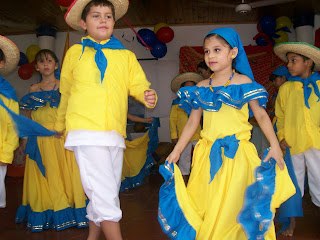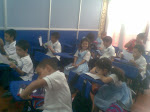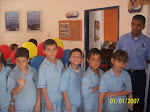miércoles, 17 de marzo de 2010
Saint Patrick's day.
Second graders celebrating Saint Patrick's day.... they enjoyed all day and share good time and so many cadies.
sábado, 6 de febrero de 2010
miércoles, 26 de agosto de 2009
SECOND GRADE

Some wonderful traditions of Hawaii include Music and dance, a cloth made from bark called Kapa cloth and the beautiful Lei's made of various floral and seashell, nuts etc... If you've ever seen any of these being done you will never forget them. I had the opportunity to experience Kapa cloth making when I was in school and enjoyed the act of working the cloth and then printing it with my own designs. I have since lost the cloth I had but will never forget the experience
miércoles, 12 de agosto de 2009
HAWAIIAN PARTY
 Aloha! Luau Party Supplies, Ideas and Recipes are our specialty. Our staff has 35 years of shared experience outfitting Luau and Hawaiian parties for home, school and corporate celebrations.
Aloha! Luau Party Supplies, Ideas and Recipes are our specialty. Our staff has 35 years of shared experience outfitting Luau and Hawaiian parties for home, school and corporate celebrations.
For basic luau decorations, consider wrapping your buffet table with a grass table skirt and have tiki torches as centerpieces. It's also festive to have an inflatable palm tree nearby. The thatched umbrella covers and tiki bar add a stylish but more extravagant touch.
Greet your guests with silk leis and say Aloha! Let them enjoy drinks served in coconut cups. Consider having hawaiian hula skirts so your friends can hula dance. For a wild celebration, think limbo game.
martes, 14 de julio de 2009
SECOND GRADE- HAWAIIAN FOOD

Poi is a Hawaiian word for the primary Polynesian staple food made from the corm of the kalo plant (known widely as taro). Poi is produced by mashing the cooked corm (baked or steamed) to a highly viscous fluid. Water is added during mashing and again just before eating, to achieve a desired consistency, which can range from liquid to dough-like (poi can be known as two-finger or three-finger, alluding to how many fingers you would have to use to eat it, depending on its consistency).
Poi made from Taro should not be confused with
Samoan poi, which is a creamy dessert created by mashing ripe bananas with coconut cream.
Tahitian po'e, which is a sweet, pudding-like dish made with bananas, papaya, or mangoes cooked with manioc and coconut cream.
viernes, 10 de julio de 2009
WHY USE GAMES TO TEACH ENGLISH

'Language learning is hard work ... Effort is required at every moment and must be maintained over a long period of time. Games help and encourage many learners to sustain their interest and work.''Games also help the teacher to create contexts in which the language is useful and meaningful. The learners want to take part and in order to do so must understand what others are saying or have written, and they must speak or write in order to express their own point of view or give information.''The need for meaningfulness in language learning has been accepted for some years. A useful interpretation of 'meaningfulness' is that the learners respond to the content in a definite way. If they are amused, angered, intrigued or surprised the content is clearly meaningful to them. Thus the meaning of the language they listen to, read, speak and write will be more vividly experienced and, therefore, better remembered.If it is accepted that games can provide intense and meaningful practice of language, then they must be regarded as central to a teacher's repertoire. They are thus not for use solely on wet days and at the end of term!
lunes, 6 de julio de 2009
Suscribirse a:
Entradas (Atom)
Importance of the English Subject
Over the past years, English has come to be considered one of the most relevant and meaningful languages in the world. This is not just because of its demand in business and technology but also because of its social and cultural implications in our increasingly global world. It is due to its role as a global language and therefore a vehicle of economic and educational success that the Colombian government has become aware of the need to foster the English language through the bilingualism process.
For this reason, the Colombian government has also developed polices to promote the teaching and learning process of English in schools from the Primary School level right through to High school levels as a mandatory subject. This policy has been carried through to implementation in the General Law of Education (Law 115 of 1994).
In this view, The Windsor Royal School vision is to become the leader educational institution in the department of Cordoba, to participate actively in the globalization process and to contribute to the students’ whole development. Hence the school has started a bilingualism process oriented by the English department, whose intention is to be the guider in all the pedagogical, academic and methological aspects involved in.
For this reason, the Colombian government has also developed polices to promote the teaching and learning process of English in schools from the Primary School level right through to High school levels as a mandatory subject. This policy has been carried through to implementation in the General Law of Education (Law 115 of 1994).
In this view, The Windsor Royal School vision is to become the leader educational institution in the department of Cordoba, to participate actively in the globalization process and to contribute to the students’ whole development. Hence the school has started a bilingualism process oriented by the English department, whose intention is to be the guider in all the pedagogical, academic and methological aspects involved in.






